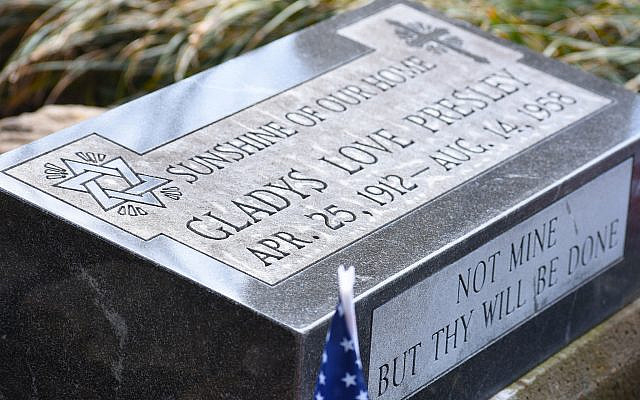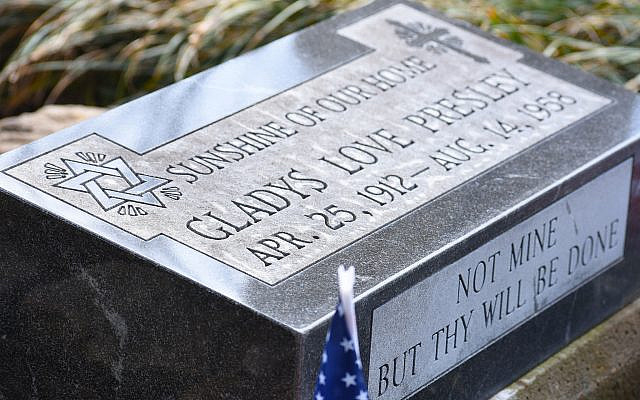Nashville calls itself “Country Music USA,” but Memphis is home of the blues — and its iconic Beale Street is the true birthplace of rock n’ roll. So when a recent muscular dystrophy conference took me to the Volunteer State, I seized the chance to explore both cities.
Along the way, I hoped to solve one of life’s most enduring mysteries: Was Elvis really a member of the tribe?
It’s not an original question. Many have speculated on the supposed Jewishness of The King, who died of a drug-induced heart attack on August 16, 1977 — exactly 45 years ago this week.
Soon after the conference began, my New York-based journalism buddy Robert Walzer — who needed a short getaway — met me in Nashville. Both of us had urgent deadlines to meet, but after three days confined to the sprawling Opryland Resort & Convention Center, with its nine acres of indoor gardens, winding rivers and fake waterfalls — not to mention its 15 overpriced restaurants and bars — we were desperate to get out and see the real Tennessee.

Hitting the open road in a rented Chevy, we headed southwest on Interstate 40 for about four hours, past towns with amusing names like Dickson, Ripley, and Bucksnort. We arrived in Memphis after dark and checked into the 450-room Guest House at Graceland Inn, which is itself located a few hundred steps from Graceland, the mansion where Elvis lived from 1957 until his untimely death at the age of 42.
That evening, while wandering along Beale Street after a jam session at B.B. King’s Blues Club, we came across a historical marker for the Chop Suey Café, a Chinese restaurant that had stood on that spot for 47 years, passing through a succession of owners — the last being a man named, of all things, Jew Sing.

That elicited a few chuckles from these two wisecracking Jewboys, but what really intrigued us was another marker several blocks up Beale Street honoring “Lansky Brothers — Clothier to the King.”
According to the plaque, Bernard Lansky and his brother, Guy, founded Lansky Brothers clothing store in 1946 with $125 from their father. The shop, known for its outlandish, trendsetting fashions, ended up outfitting Elvis only 10 years later, for his very first performance on the Ed Sullivan Show.
“I wonder if this Lansky guy is still around,” Robert mused aloud as we sauntered down Beale Street, surrounded by flashing blue neon signs and crowds of locals letting the good times roll.
Memphis honors two Kings — Elvis and Rev. Martin Luther
The next morning, Robert got his answer. While I was busy interviewing hematologists at the nearby St. Jude Children’s Research Hospital, my inquisitive friend headed for the historic Peabody Hotel in downtown Memphis, where Lansky Brothers has sold men’s clothing and sportswear since 1981.

There, behind the cash register, was none other than Hal Lansky, son of the late Bernard Lansky. At first elusive, Hal opened up once Robert identified himself as a reporter with the Wall Street Journal — and quickly agreed to an interview that afternoon.
In the meantime, we toured the most important historical site in Memphis. The National Museum of Civil Rights is built on the hallowed grounds of the old Lorraine Motel, where Martin Luther King Jr. was assassinated in 1968. A powerful testament to the legacy of MLK, this museum is far more interesting and historically significant than Graceland itself, which both of us found to be a hyped-up, kitschy tourist trap with long lines and way too many gift shops.

In fact, the King of Rock n’ Roll had deep respect for King the civil-rights icon. Despite the open hostility displayed at that time by most of his fellow Southerners toward black Americans, Elvis performed a moving tribute to racial justice with his 1968 song, “If I Can Dream,” only two months after MLK’s murder by an avowed white supremacist.
The song’s lyrics — “There must be lights burning brighter somewhere / Got to be birds flying higher in a sky more blue / If I can dream of a better land / Where all my brothers walk hand in hand” — seem particularly poignant given today’s bitterly divisive American political landscape.
Truth be told, the only things I found really worthwhile at Graceland was the Elvis classic car collection across the street — and in the meditation garden next to the mansion itself, the gravestone for the singer’s mother, Gladys Love Presley, which contains both a cross and a Jewish Star of David.
“The large marble cross was Gladys Presley’s original monument at Forest Hill Cemetery,” a nearby plaque informs visitors, “and the headstone, which features the Star of David to represent Gladys’ Jewish heritage, was placed at her grave in December 1964.”

The case of the missing gravestone
Yet that’s only part of this intriguing mystery.
Roselle Kline Chartock, historian, professor and author of The Jewish World of Elvis Presley, said that in 2017, when she began researching the topic, she lacked sufficient documentation to say definitively that Elvis had a Jewish ancestor. In fact, the first page of her 276-page book begins: “Elvis and Jews. Two words that don’t seem to go together.”
It was known that his great-great-grandmother, Nancy Burdine, was a Jew whose family came from Lithuania around the time of the American Revolution. That, at least halachically, would make Elvis a Jew too — yet still, Chartock wasn’t fully confident.
According to Chartock, in 1977, after Elvis died, his viciously antisemitic father, Vernon, moved the remains of his late wife to Graceland, and, “somehow, the gravestone with the Jewish star disappeared.”

“But everything changed in 2018,” Chartock said in a phone call from her home in Pittsfield, Mass. “An article appeared in the Memphis Commercial-Appeal stating that Angie Marchese, the archivist at Graceland, had found a gravestone hidden in a 20,000-square-foot warehouse — the original gravestone that Elvis had a Jewish star placed on.”
One of Presley’s longtime Jewish friends, the recently deceased Marty Lacker, saw to it that the gravestone was not only brought out of storage, but unveiled on the 60th anniversary of Gladys Love Presley’s death. It is now displayed prominently in the meditation garden and surrounded by flowers — and that’s exactly where it’s been for the last four years, where it is seen by millions of tourists annually.
Apparently, Elvis was well aware of his yiddishkeit but as a child was warned not to advertise his heritage because “people didn’t like Jews,” according to Chartock.
“He would often make a joke, ‘I don’t want to get left out of heaven on a technicality,’” Marchese said in a June 2021 interview with the Jewish Telegraphic Agency. “So he would wear a Star of David, a chai and he would also wear a cross. He wanted to keep all his bases covered.”
Elvis the mensch: A man of gratitude and generosity
As an example of his philanthropy to Jewish causes, in 1972, the Memphis Hebrew Academy sent a delegation to Graceland, hoping to solicit a $1,000 donation from Elvis. He excused himself for a moment, then came back and handed the group a check for $150,000—the equivalent of $1 million today.

“Elvis, you must have made a mistake,” their leader said. “I didn’t make a mistake,” Presley replied. “I know what I’m doing.”
Says Chartock: “The fact is, Elvis studied the kabbalah, he was enchanted with gematria and he talked to his friends about how he was proud of his heritage. He was not only halachically Jewish, he was also a good and generous humanitarian.”
Hal Lansky, who wrote the foreword to Chartock’s book, couldn’t agree more.
“Elvis is our tourism business. If it weren’t for him, people wouldn’t come here,” Hal told us later that evening, over drinks at the Peabody Hotel bar. “He loved Beale Street. You can go anywhere in the world, and you may not speak their language. But say the word ‘Elvis’ and a smile will come over anyone’s face.”
Hal, 70, knew Elvis as a child, and has the pictures to prove it — including a large 1956 black-and-white photo showing America’s best-known cultural icon posing with a very young Hal and a few of his older siblings.

As he tells it, back in 1946 — when Bernard went into business with one of his brothers right after the end of World War II — “Memphis had the largest army depot in the world. So they started selling army pants, fatigues, cots, anything they could get their hands on.” But their clientele was mainly African-Americans who lived in the downtown area, in what was still then a deeply segregated South.
“If you were white, you didn’t belong on Beale Street,” Hal said. “One day, my dad saw a young white man enter the store. He said, ‘Mr. Lansky, I don’t have any money, but one day when I’m rich, I’m gonna buy you out.’ My father told him: ‘Don’t buy me out, just buy from me.’”
‘I put him in his first suit, and I put him in his last suit’
That young man was Elvis Presley, and he quickly became Lansky’s best customer.
“That night, when Elvis appeared on the Ed Sullivan Show, my dad said, ‘This guy is destined for stardom,’” Hal recalled. “I delivered things to his house more than a few times. He was always real nice and polite, and shy. Elvis also donated quite a bit to the local Jewish community center.”

Hal was 25 when Presley died, of causes that are are still not completely clear, even now. Reports suggest he was chronically ill with glaucoma, diabetes and constipation — partly the result of his habit of gorging on cheeseburgers and other high-fat, high-cholesterol foods. Elvis was also addicted to painkillers.
The day after Presley’s passing, Bernard placed a full-page tribute in the local Memphis Press-Scimitar: “Elvis, you were a man who touched the lives of so many,” it said. “You were gifted beyond belief. It was just 23 years ago we first met you, staring into our shop windows, just looking, friendly and so sure of your future. We became good friends, and for the rest of our lives we shall have the lasting memory of your friendship.”
Jimmy Carter, who was president at the time, issued his own statement: “Elvis Presley’s death deprives our country of a part of itself… His music and his personality, fusing the styles of white country and black rhythm and blues, permanently changed the face of American popular culture. His following was immense. And he was a symbol to people the world over of the vitality, rebelliousness and good humor of this country.”

Fittingly, Elvis was laid to rest in a white Lansky suit, light blue shirt, and white tie. As Bernard would later say, “I put him in his first suit, and I put him in his last suit.”
Hal then stood up, apologizing that he had to attend to customers. We followed him back to the store, where he handed each of us autographed copies of his souvenir book, titled simply Lansky Brothers: Clothier to the King.
“Our business is on fire. Everybody’s been shut in for the last two years because of COVID, and now people want to go to concerts, get out and spend money,” Hal told Robert and me with a grin. “We’re like a tourist attraction in itself.”
Before leaving, I had one last question for this affable shopkeeper: Was he by any chance related to Meyer Lansky, the infamous Jewish gangster who ran casinos in Las Vegas and Havana but who, despite his well-known mafia connections, was never found guilty of anything more serious than illegal gambling?
“We get asked that all the time. He came from the same place [in present-day Belarus] my family did,” Hal replied. “Who knows, he might be in my family tree. We just don’t know what branch he’s on.”
https://blogs.timesofisrael.com/
Michael Loyman

